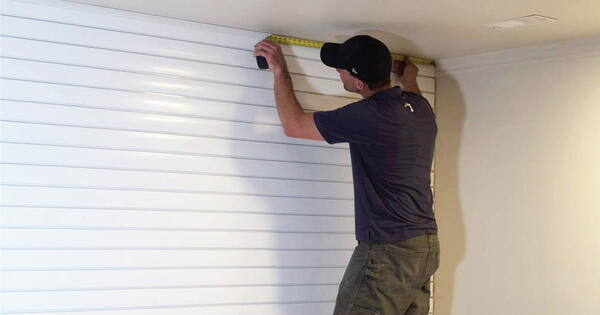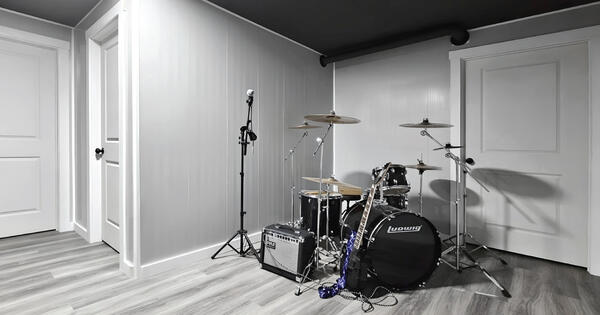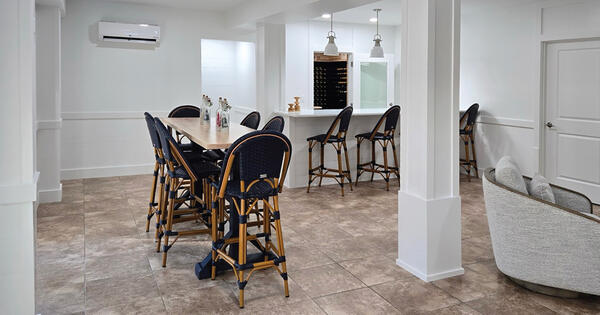This post was originally published in November 2023. Last updated: November 2025.
Finishing a basement is a major investment, and understanding the costs upfront will help you plan your project, stay on budget, and get the most value from your renovation. This guide covers all aspects of basement finishing costs, including materials, labor, room types, return on investment, and tips for making the project more DIY-friendly with Trusscore products.
Why Is Finishing a Basement Worth It?
If you’re on the fence about whether or not you should finish your basement, you shouldn’t be. There are several benefits to finishing a basement:
A finished basement adds extra living space to your home
Whether you need a family room, a home office, a workout area, or a media room, a finished basement creates a flexible space that can accommodate multiple activities. This expansion of usable square footage makes your home feel larger and more functional.
A finished basement can increase your home’s value
Homes with finished basements are often more attractive to potential buyers, and adding this type of living space can help your property stand out in a competitive market. On average, finishing a basement can add about 10 percent to your home’s resale value.
A finished basement can help improve your overall home organization
Unfinished basements often become a dumping ground for boxes, bins, and items that don’t have a place elsewhere. By installing well-organized storage solutions such as closets, built-in shelves, cabinets, or a wall-mounted system like Trusscore SlatWall, you can reduce clutter in the rest of your home and easily access the items you need.
A finished basement can boost your home’s energy efficiency
Proper insulation and wall finishes help regulate basement temperatures, reducing your home’s overall heating and cooling costs. This can be particularly valuable if your basement is directly below living spaces or contains mechanical systems like HVAC units.
A finished basement can reduce the noise in your home
Soundproofing from wall and ceiling finishes can lessen noise from laundry machines, entertainment systems, or household activities, creating a quieter, more comfortable home environment.


How Much Does It Cost to Finish a Basement in 2026?
The cost of finishing a basement varies depending on the size of the space, the materials you choose, and whether you hire professionals or DIY. A basement without any livable elements — such as framing, plumbing, insulation, ventilation, flooring, or wall coverings — requires more work and a higher investment.
In the United States, finishing a basement typically costs between $15,000 to $75,000, with the national average around $32,000. If you plan to renovate or remodel an existing finished basement, your costs will differ. A basement renovation, which might include updating finishes or adding storage, generally costs $1,000 to $20,000. A remodel, which changes the basement’s layout or structure, can range from $4,000 to $45,000, with an average cost of about $20,000. These renovation or remodel costs are in addition to the initial finishing expenses.
| Basement Size | Basic Finish | Mid-Range Finish | High-End Finish |
|---|---|---|---|
| 500 sq ft | $3,500 to $11,500 | $10,000 to $17,500 | $20,000 to $35,000 |
| 1,000 sq ft | $7,000 to $23,000 | $20,000 to $35,000 | $40,000 to $70,000 |
| 1,500 sq ft | $10,500 to $34,500 | $30,000 to $52,500 | $60,000 to $105,000 |
Prices are national averages for 2026 and may vary based on location, materials, and project complexity.
What Factors Influence Basement Finishing Costs?
There are several factors that will influence the price of your project. Here’s a helpful cost breakdown for finishing a basement to set your expectations:
Framing
If your basement is unfinished with only concrete walls and floors, framing is necessary before adding walls or ceilings. Wood framing costs $1 to $5 per square foot for materials, depending on local lumber prices, plus $4 to $8 per square foot for labor. Taller ceilings and additional windows or door openings increase framing costs.
Insulation
Insulation keeps your basement warm in the winter and cool in the summer. You can choose spray foam, batt insulation, or blow-in insulation. Material costs range from $0.50 to $2 per square foot, with labor costs adding $1 to $1.50 per square foot. Proper insulation also helps prevent moisture and mold issues.
Wall and Ceiling Covering
Many homeowners finish basements with drywall, which costs $1.50 to $3.50 per square foot installed, including materials and labor. Costs may increase for taller ceilings, specialty drywall types, or textured finishes. If your basement is prone to moisture or flooding, water-resistant wall and ceiling panels like Trusscore Wall&CeilingBoard are an excellent alternative. For example, an 18 x 24 ft basement would cost around $3,500 using Trusscore panels, which can be installed yourself to save on labor costs.
Paint
If your basement walls are covered with drywall, you will also need to paint them. DIY painting costs $1 to $3 per square foot, while hiring a professional ranges from $2 to $6 per square foot. Pre-finished panels such as Trusscore eliminate the need for painting, saving both time and money.
Flooring
Flooring costs vary depending on the material you choose. Laminate flooring costs $1 to $6 per square foot, carpet costs $2 to $8, ceramic tile costs $7 to $14, and hardwood ranges from $6 to $13 per square foot. Higher-end or waterproof flooring options will increase costs.
Electrical Wiring
You should only factor in electrical wiring costs if you plan to create new rooms in your basement as part of your project. New wiring costs $3 to $5 per square foot on average while rewiring costs between $6 to $10 per square foot.
Plumbing
If your basement includes a bathroom or laundry area, plumbing adds around $6 per square foot. Costs increase with the number of fixtures or the complexity of the installation.
Light Fixtures
Since most basements have limited natural light, light fixtures are essential. Installation costs range from $75 to $500 per fixture, depending on type and complexity.
Permits
Any structural, electrical, or plumbing changes typically require permits, which cost between $150 and $1,500 depending on your municipality.
Furnishings
After your walls and ceilings are taken care of, you should also factor in furniture costs, especially if you’re starting from scratch. The collective cost of furniture, rugs, artwork, and accessories or décor can range anywhere from $2,500 to $20,000 or more depending on your decorating vision.
* All prices listed in this post are in USD and represent a national average. Actual pricing may vary depending on your region and the materials you choose to build with. Last updated: November 2023.
How Does Basement Size Affect Cost?
Larger basements naturally require more materials, labor, and finishes, which increases total costs. The table below shows average costs by square footage for 2026:
| Basement Size | Estimated Cost (Standard Finish) | Estimated Cost (High-End Finish) |
|---|---|---|
| 500 sq ft | $3,500 to $11,500 | $20,000 to $35,000 |
| 1,000 sq ft | $7,000 to $23,000 | $40,000 to $70,000 |
| 1,500 sq ft | $10,500 to $34,500 | $60,000 to $105,000 |
Is Basement Finishing a Good Investment?
Finishing your basement generally offers a 64 to 70 percent return on investment and can add approximately 10 percent to your home’s resale value. Additionally, a finished basement may provide rental income opportunities if you create a separate suite. Compared to other home improvement projects, basement finishing is often one of the highest ROI renovations, especially in regions with high demand for additional living space.
Start Planning Your Trusscore Project
Use the Trusscore Cost & Materials Estimator to explore different design options for your interior space.
DIY vs Professional Install for Finishing a Basement
It’s no surprise that professional basement finishing costs more than doing it yourself — you must pay for not only the materials, but also for the labor, which quickly adds up depending on the skill level and speed of the person you hire.
An unfinished basement is an eyesore for prospective home buyers, and the projected cost of finishing it will negatively affect how much they’ll offer you for your home.
If you’re planning to DIY this reno, follow our step-by-step guide and start by breaking the project down into three separate categories — walls, ceiling, and flooring — and tackling each category one at a time. This approach can help you keep costs low and make the project more manageable for you as a DIYer.
If you include Trusscore Wall&CeilingBoard in your design, your project is even more DIY-friendly: Our pre-finished panels install four times faster than drywall with no special tools or skills required. You’ll even avoid time-consuming steps like mudding, taping, priming, and painting. Plus, once they’re installed, they’re built to last. The panels are scratch, dent, and damage resistant, and they’re 100% moisture and water resistant. And unlike drywall, the panels can be routinely cleaned with soap and water, ensuring your finished basement always looks its best.



Frequently Asked Questions About Basement Finishing
How long does it take to finish a basement?
Finishing a basement usually takes between 4 to 12 weeks, depending on the size of the space, complexity of the project, and whether you DIY or hire professionals.
Do I need permits?
Yes, you typically need permits for electrical, plumbing, or structural changes. Permit costs range from $150 to $1,500 depending on your local municipality.
Is finishing a basement a good investment
Yes. Basement finishing typically returns 64 to 70 percent of your investment and can add roughly 10 percent to your home’s value.
What is the cheapest way to finish a basement?
DIY with cost-effective materials such as laminate flooring and Trusscore panels reduces labor costs and overall spending.
Can I finance basement finishing?
Yes. Options include home improvement loans, home equity lines of credit (HELOCs), or personal financing.
How much can I increase my home value with a finished basement?
A finished basement typically adds about 10 percent to your home’s value, depending on quality, size, and local market conditions.
Should I DIY or hire a professional?
Simple projects like installing flooring or wall panels are suitable for DIY. Complex electrical, plumbing, or structural work is best handled by professionals.





